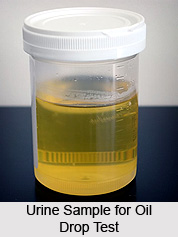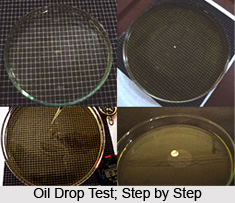 Oil drop Test in Ayurveda shows the importance of urine excreted from the human body. Oil drop Test or Taila Bindu Pariksha, a most ancient method of urine examination for ascertaining the prognosis of diseases was very popular in the medieval India. But this process became obsolete from the end of 17th Century. Technique of this test is very crude and there are chances of variations in the observations.
Oil drop Test in Ayurveda shows the importance of urine excreted from the human body. Oil drop Test or Taila Bindu Pariksha, a most ancient method of urine examination for ascertaining the prognosis of diseases was very popular in the medieval India. But this process became obsolete from the end of 17th Century. Technique of this test is very crude and there are chances of variations in the observations.
There are the basic requirements to do the oil drop test. These are: the testing containers, volume of the urine, size of the oil drop, height of the oil drop from the surface of urine, variety of sesame oil, etc.
With a dropper, there is a necessary to place one drop of sesame oil in a sample of urine. If the drop spreads immediately, the physical disorder is easy to cure. If the drop sinks to the middle of the urine sample, this indicates illness is difficult to cure. If the drop sinks to the bottom, illness may be very difficult to cure.
If drop of sesame oil spreads on the surface in wave-like movements, this indicates the Vata disorder in human body. If the drop of sesame oil spreads on the surface with multiple colours visible like a rainbow, this indicates Pitta disorder. If drop of the sesame oil breaks up into pearl-like droplets on the surface of urine, this indicates Kapha disorder.
The normal urine has a typical uremic smell. However, if the urine has a foul odour, this indicates that there are toxins in the system. An acidic smell which creates a burning sensation indicates excess Pitta.
A sweet smell of the urine indicates a possible diabetic condition in human body. In this condition, the individual experiences goose bumps on the skin while passing urine. The gravel in the urine indicates the likelihood of stones in the urinary tract.
 The oil drop test detoxifies poisons in the human body system and helps absorption in the large intestine as well as the elimination of feces. If one takes a cup of urine every morning it will help to cleanse and detoxify the large intestine.
The oil drop test detoxifies poisons in the human body system and helps absorption in the large intestine as well as the elimination of feces. If one takes a cup of urine every morning it will help to cleanse and detoxify the large intestine.
While on a contrary, the perspiration is a by-product of fatty tissue. The sweating is necessary to regulate the body temperature of the human body (Optimum Temperature). The sweat keeps the skin soft, maintains the flora of the pores of the skin and also maintains the elasticity and tone of the skin.
Excessive sweating is a hydration disorder that can create fungal infection and reduces the natural resistance of the skin. Insufficient sweating will also reduce the resistance of the skin. It will cause the skin to become rough and scaly, creating dandruff of hair.
There is a special relationship between the skin and the kidneys since the excretion of watery wastes is primarily the function of these two organs. Thus, perspiration is indirectly related to the formation of urine. Like urine, perspiration is closely related to pitta. In summer, people perspire profusely, but their urination is reduced because waste products are eliminated through perspiration. In winter, many people perspire less and urinate more.
The excessive urination may cause too little perspiration production and excessive perspiring may result in a scanty volume of urine. Thus, it is necessary that the production of perspiration and urine must be in equilibrium position. Diabetes, psoriasis, dermatitis and ascites (dropsy) are examples of diseases resulting from an imbalance of perspiration and urine in the body.
The excessive perspiration reduces the optimum temperature of the human body and creates dehydration. In the same way, too much urination also creates dehydration and also will cause coldness of the hands and feet.





